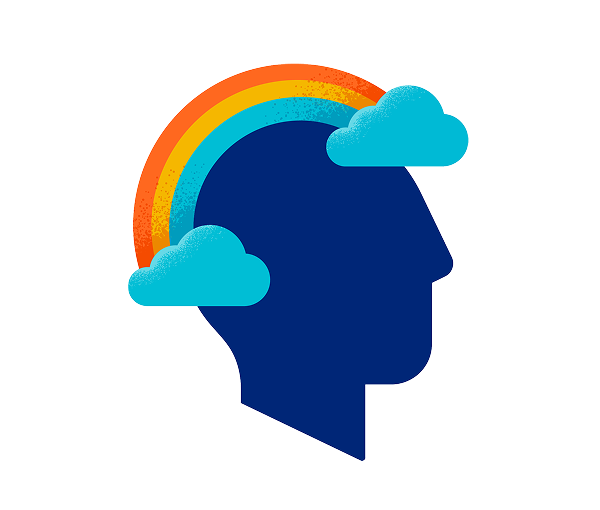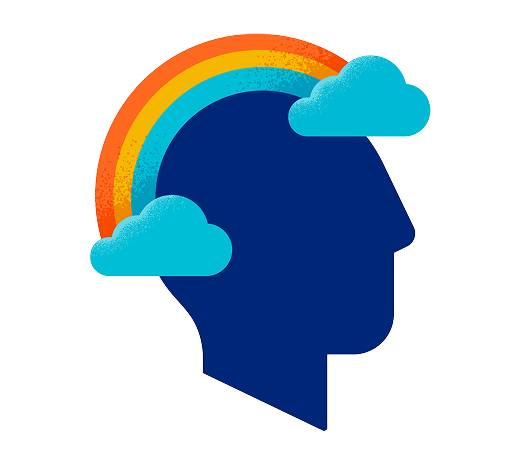
What factors impact mental health and behavioral health?
Many factors contribute to a mental health condition. For some adults, life changes associated with aging may increase the risk for developing a mental health condition. Common behavioral health challenges, such as loneliness or caregiver burnout, may lead to a more serious mental health concern, like depression, if left untreated. In addition to mental health resources, eligible UnitedHealthcare Medicare Advantage members may also have access to resources to help support behavioral health.

Learn how to address and improve mental health in older adults
UnitedHealthcare Medicare Advantage members may be eligible for benefits, programs and resources to help support their mental health. These 3 areas of focus may help address mental health concerns:1

Factors that may contribute to mental health conditions in older adults
There are several risk factors related to behavioral health that may contribute to declining mental health in older adults. Physical challenges, such as a chronic condition or pain, or mobility issues may lead to decreased physical activity and loss of social connection. Social isolation and loneliness, if living apart from loved ones or after retiring, may cause a decreased sense of purpose. Caregiver burnout from the responsibility of caring for a loved one with a chronic health condition, or grief after losing a loved one may also contribute to declining mental health.5
Mental health conditions in older adults
At every stage of life, it’s important to evaluate your mental health. Older adults may face life changes that may contribute to feelings of grief or sadness. When these feelings become unmanageable, they may lead to a mental health condition.6 As a UnitedHealthcare Medicare Advantage member, you may be eligible for mental health programs and resources designed to support you on your wellness journey.
Depression is more than “feeling blue” or the immediate grief felt after losing a loved one.2
Symptoms of depression in older adults include:7
- Decreased energy
- Difficulty sleeping or concentrating
- Eating more or less than usual
- Feelings of hopelessness or worthlessness
- Ignoring responsibilities
- Increased substance use
- Irritability
- Loss of interest in hobbies
- Persistent feeling of “emptiness”
- Thoughts of death or suicide
- Unintended weight gain or loss
Depression and anxiety often occur together. Experiencing symptoms of both depression and anxiety may decrease quality of life. If anxiety remains untreated, older adults may experience cognitive impairment, lower quality of life or disability.8 Anxiety may cause both physical and mental health concerns.
| Physical symptoms of anxiety may include:9 | Emotional symptoms of anxiety may include:9 |
|---|---|
|
|
Although older adults are less likely to use illicit or illegal drugs, the number of older adults abusing alcohol or misusing prescription or over-the-counter (OTC) medicine is increasing.10, 11 If someone misuses prescription medicine, such as pain medication, they may start taking it in a way not directed by a doctor. 12
Older adults may turn to substance use as a way to cope with big life changes, such as loss of a loved one or retirement. As a result of the body’s aging process, alcohol and drugs are absorbed differently and may have a stronger impact.10
Substance use disorder (SUD) is a diagnosable condition. SUD is characterized by:13
- Loss of control over use
- Significant impairment
- Relationship problems
- Risky behavior
- Higher tolerance for or greater need of the substance
It is common for people to have a SUD and a mental health condition at the same time.12
Crisis and emergency care hotlines
Need help now? Support is available 24/7.
Suicide and Crisis Lifeline
Call or text 988 for free, confidential support
Emergency services
Call 911 for immediate medical, fire or safety emergencies
Substance Use Helpline
Call 1-855-780-5955 (TTY 711) for support with alcohol or drug concerns and care
National Domestic Violence Hotline
Call 1-800-799-SAFE (7233) or text “START” to 88788 for confidential help
